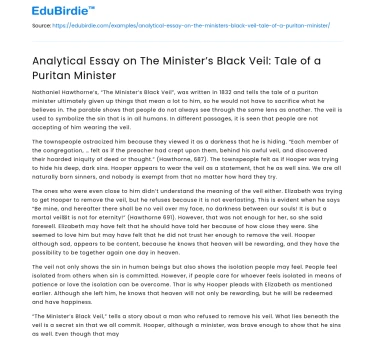Nathaniel Hawthorne’s, “The Minister’s Black Veil”, was written in 1832 and tells the tale of a puritan minister ultimately given up things that mean a lot to him, so he would not have to sacrifice what he believes in. The parable shows that people do not always see through the same lens as another. The veil is used to symbolize the sin that is in all humans. In different passages, it is seen that people are not accepting of him wearing the veil.
The townspeople ostracized him because they viewed it as a darkness that he is hiding. “Each member of the congregation, … felt as if the preacher had crept upon them, behind his awful veil, and discovered their hoarded iniquity of deed or thought.” (Hawthorne, 687). The townspeople felt as if Hooper was trying to hide his deep, dark sins. Hooper appears to wear the veil as a statement, that he as well sins. We are all naturally born sinners, and nobody is exempt from that no matter how hard they try.
Save your time!
We can take care of your essay
- Proper editing and formatting
- Free revision, title page, and bibliography
- Flexible prices and money-back guarantee
The ones who were even close to him didn’t understand the meaning of the veil either. Elizabeth was trying to get Hooper to remove the veil, but he refuses because it is not everlasting. This is evident when he says “Be mine, and hereafter there shall be no veil over my face, no darkness between our souls! It is but a mortal veil‒it is not for eternity!” (Hawthorne 691). However, that was not enough for her, so she said farewell. Elizabeth may have felt that he should have told her because of how close they were. She seemed to love him but may have felt that he did not trust her enough to remove the veil. Hooper although sad, appears to be content, because he knows that heaven will be rewarding, and they have the possibility to be together again one day in heaven.
The veil not only shows the sin in human beings but also shows the isolation people may feel. People feel isolated from others when sin is committed. However, if people care for whoever feels isolated in means of patience or love the isolation can be overcome. Thar is why Hooper pleads with Elizabeth as mentioned earlier. Although she left him, he knows that heaven will not only be rewarding, but he will be redeemed and have happiness.
“The Minister’s Black Veil,” tells a story about a man who refused to remove his veil. What lies beneath the veil is a secret sin that we all commit. Hooper, although a minister, was brave enough to show that he sins as well. Even though that may be true, ultimate redemption and rewards lie within heaven






 Stuck on your essay?
Stuck on your essay?

